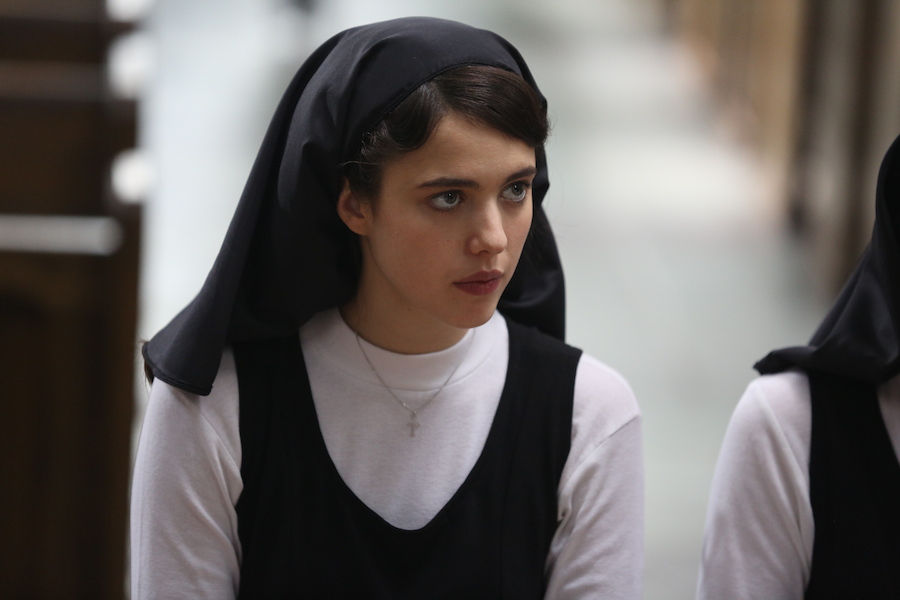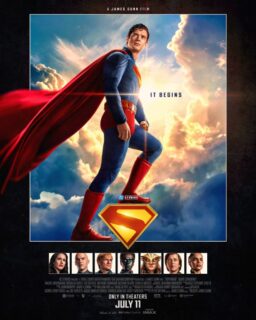Thumbnails is a roundup of brief excerpts to introduce you to articles from other websites that we found interesting and exciting. We provide links to the original sources for you to read in their entirety.—Chaz Ebert
1.
“Margaret Betts on ‘Novitiate’“: The Sundance prize-winning filmmaker chats with me at Indie Outlook about her marvelous new film, one of the year’s best.
“[Indie Outlook:] ‘Margaret Qualley’s eyes are so skillful at conveying a hunger for something more, as previously evidenced by Spike Jonze’s Kenzo World ad, where we first see her seated at a suffocating public event.’ [Betts:] ‘Rather than audition my actors, I have meetings with them either in-person or via Skype. For ‘Novitiate,’ I met with around 40 up-and-coming new actresses between the ages of 17 and 21 or 22. The oldest person we cast in the group of novitiates was 24. Within five minutes of Skyping with Margaret, I was completely taken with her. She just had this magnetism and quiet pain, as well as a centeredness and a strength that hit me over the head like a lightening bolt. Apart from all of the research that I did, a lot of this film was a nod to Audrey Hepburn in ‘The Nun’s Story,’ which was one of my favorite movies while growing up. In some ways, ‘Novitiate’ spawned from a desire to make an edgier, more contemporary-feeling, slightly darker version of ‘The Nun’s Story.’ The image of Audrey Hepburn’s face, with these huge eyes, looking up towards an alter, searching for something, had become embedded in my memory. I was struck by the whites of her eyes. The bottom of Margaret’s iris doesn’t quite touch the bottom of her eyelid, and Audrey Hepburn’s eyes had that same little bit of empty white space. Anytime there is an empty space like that, people project their own background, their own feelings, their own struggles onto them. You put yourself in that character right away. Margaret didn’t remind me of Audrey in her voice or body language, but in her similarly wide-eyed look. She’s also such a lovely, hard-working person, not to mention a bit of a loner. She isn’t the sort of kid who goes to clubs and parties every night and has tons of friends and boyfriends. She often keeps to herself.”
2.

“My worst moment: ‘Transparent’ co-star Alexandra Billings confronts transgender negativity“: In conversation with the Chicago Tribune‘s Nina Metz.
“This is about power — white, male, heteronormative, cisgender power. And if you look at Hollywood, that’s who is in control. Especially trans people of color, we’re at the bottom of the rung. So I feel like it’s important say something — not combative, not argumentative. It’s not even about debate. All I was doing was explaining, from a place of kindness and understanding and compassion. Just giving information. Not teaching, not lecturing, just saying, ‘Guys, here’s the ramifications of some of these jokes.’ Because let me say, I love insult comedy — I love Joan Rivers and Don Rickles. I think that stuff is hilarious! And I don’t take myself so seriously that I can’t make fun of myself. I totally get that we need to let loose once in awhile. But when we’re in the center of the kind of political and human shattering that’s going on, when there are LGBT youth who turn on their TV and see this? Then the message is hopelessness, not humor. I can actually give you 999 different hilarious situations that actually have happened to me that we could exaggerate for comic effect. I could give you comical situations that are really funny but aren’t harmful. I’m fine with that! But I can no longer be a party to us being the punchline. I can’t do it anymore. It sends a message of hopelessness. And that’s not funny. I called my manager and told him what happened and he was like, ‘Good for you!’ So I felt supported. I felt like, ‘OK, I’m not alone.’ Whether they laughed at me when I left or had a change of heart, that was inconsequential to the fact that I was supported by my wife and by the people who work with me. It allowed me to speak louder.”
3.

“The Visual Language of Oppression: Harvey Wasn’t Working in a Vacuum“: Essential commentary from Nina Menkes at Filmmaker Magazine.
“We’ve all heard the phrase ‘the objectification of women,’ but most don’t know how precisely and insidiously this objectification manifests itself cinematically inside the very details of shot design. Laura Mulvey, in her seminal expose, ‘Visual Pleasure and Narrative Cinema,’ was the first to explain that women in traditional cinema primarily signify ‘to-be-looked-at-ness.’ Demoting half the world’s population to use-object happens not only at the level of script and narrative but within actual framing choices and lighting strategies. Almost without exception, every ‘important’ and ‘great’ white male director, those who win Cannes or the Academy Awards, those who are considered must-see viewing for any aspiring student of cinema — e.g. Hitchcock, Welles, Scorsese, Godard, Tarantino, Aronofsky (to name only a few) — utilize cinematic techniques that belittle women while appearing to glamorize them. And although these directors are considered auteurs with their own distinct styles, and their films represent very different stories and genres, there is a stunning consistency, and frankly, a total lack of originality around the way these men use lighting, angles, POV and framing to formally disempower women on screen.”
4.

“On That Lost Three-Hour Version of ‘Superman’ and the Curious Pleasure of TV Edits“: Anothre great piece from The Talkhouse‘s Jim Hemphill.
“Perhaps the most significant television alteration of a major studio film during the period when I was consuming a large number of my movies via the idiot box was the ABC ‘Sunday Night at the Movies’ presentation of Richard Donner’s ‘Superman: The Movie’ in 1982. ABC spread the movie out over two nights and restored over half an hour of material that had been cut from the 1978 theatrical release; that version ran just under two-and-a-half hours, but the ABC cut clocked in at more than three hours without commercials. As with ‘Halloween,’ I dutifully monitored the airing at the side of my Betamax to record a copy for posterity, a task made trickier by the fact that it required two tapes to capture the majesty of the three-hour-plus opus. This extended cut of ‘Superman’ was an interesting companion piece to Donner’s propulsive theatrical version in that there weren’t many truly drastic differences – mostly just lengthening of sequences that were already there and minor additions of a minute here, thirty seconds there – yet the movie felt completely different. In short, it felt like something that belonged on TV, because by drawing Donner’s original rhythms out the ABC version more closely resembled the pace of a network series in which digressions and pauses are not exceptions but rules, necessities both in terms of sustaining a long-form story and in terms of making an impression on an audience that might be doing other things while the show is on – talking on the phone, making out, watching kids, cooking, etc. At the time, the extended cut of ‘Superman’ didn’t seem better or worse than Donner’s original, just different – a leisurely, comforting warm bath compared to the brisk athletic swim of the theatrical release.”
5.

“Netflix has a mess on its hands with the collapse of ‘House of Cards’“: According to David Ng and Meg James at The Los Angeles Times.
“Among ‘House of Cards’ fans, the most recent season was seen as something of a creative resurgence but the show was clearly on the decline and had lost a lot of its buzz. Creator and showrunner Beau Willimon had left the show last year after four seasons. ‘During the time I worked with Kevin Spacey on ‘House of Cards,’ I neither witnessed nor was aware of any inappropriate behavior on set or off,’ Willimon said in a statement. ‘That said, I take reports of such behavior seriously and this is no exception. I feel for Mr. Rapp and I support his courage.’ Rapp alleged that he was 14 when Spacey made an unwanted sexual advance on him during the 1980s. Spacey responded by saying that he didn’t recall the incident, but offered Rapp ‘the sincerest apology for what would have been deeply inappropriate drunken behavior.’ The two-time Academy Award winner also used the opportunity to come out as a gay man. Since Sunday, the accusations have quickly snowballed, including an unnamed artist who told Vulture that he was a minor when he entered into a consensual sexual relationship with Spacey decades ago. On Thursday, eight current and former ‘House of Cards’ employees alleged to CNN that Spacey created a ‘toxic’ work environment with his behavior. The allegations include one former production assistant who said Spacey sexually assaulted him during one of the show’s early seasons. A representative for Spacey could not be reached for comment.”
Image of the Day

Chicago Movieoke, the tremendously enjoyable cinematic brand of karaoke orchestrated by Channel Awesome star Fard Muhammad will be hosting the November 9th after-party of the Music Box Theatre’s Cinepocalypse festival in Chicago. Go experience it for yourself. It’s a ton of fun.
Video of the Day
BEETLEJUICE: A GHOST WITH THE MOST STORY (Mashup trailer of BEETLEJUICE and A GHOST STORY) from Nelson Carvajal on Vimeo.
At his site, Free Cinema Now, master editor Nelson Carvajal offers a most inspired mash-up of Tim Burton’s comedy classic “Beetlejuice” with a film sure to make many a ton ten list this year, David Lowery’s “A Ghost Story.”












